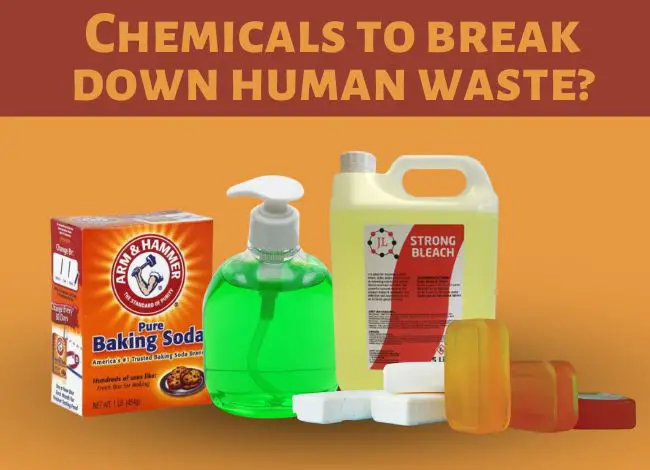 There may be some issues with the feces, and the most disturbing one is that it is not dissolving in the toilet. If the poop is big and hard, it can be stuck in the toilet, creating a clogging problem. These processes are really simple and easy to execute. You can perform these on your own without facing any problems.
There may be some issues with the feces, and the most disturbing one is that it is not dissolving in the toilet. If the poop is big and hard, it can be stuck in the toilet, creating a clogging problem. These processes are really simple and easy to execute. You can perform these on your own without facing any problems.
Clogged toilets are something that is very annoying and disgusting. Not only that, it is unhygienic; in this case, you need to take stringent measures to cut that out. The toilet drain stops mobilizing rough poops if you do not flush these on a daily basis. Poop or feces, if clogged, can be the worst nightmare for you. There are loads of things that can be used to dissolve the feces in the toilet.
In this article, we apprehend some of the best types of chemicals that can ensure that poop will be broken down effortlessly.
List of chemicals that break down the poop
There are lots of products that are responsible for breaking down the poop. You should always prepare yourself for a clogged bathroom. You need to apply some of the materials so that these never happen. Take some cogent and popular sedatives from the market for that purpose. Take note that removing clogs can be so improper and flirty. So before taking the prospect into an invertible contingency, you must put on gloves and a mask, or you might also need a ventilation system. The feces or poop cannot be dissolved that easily; in fact, it creates an unhygienic environment in the washroom that intensifies the bad smell in the washroom.
Take note of these robust materials that can play against the stringent ingredients listed here. Let us see some of those products that can break down the poop.
- Specific enzymes
- Strong Bleach
- Baking soda
- White vinegar
- Commercial cleaners
- Liquid Soap and detergents
| Effective Solution | Time to settle |
| 1 cup of baking soda and 2 cups of vinegar | 20 minutes |
| 2 cups of bleach with A pot of hot water | 30 minutes |
| 1 cup of salt and 2 cups of baking soda | 20 minutes |
| 2 cups of enzymes and one pot of hot water | 1 hour |
| 2 cups Commercial cleaners like Lysol, Darno Max, or WD40 | 10 minutes |
| 2 cups of Liquid Soap or detergents and one pot of hot water | 20 minutes |
Consequences of Unbreakable Poops
Poops can be much more serious if they get jammed in the drainage pipe. The consequences are pretty much severe, as it annihilates the entire sewage system. So addressing these issues is a crying need, and you must seek proper ways to eradicate blocked poops.
Can Poop Get Stuck In Your Pipes?
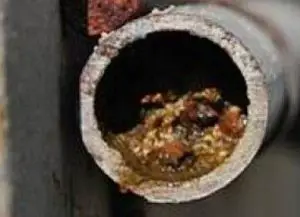 Sometimes the poop is so massive that it refuses to go through the drainage pipe; consequently, it stacks badly in the sewage. When dealing with a pipe clog, you need a good source of terminators to occupy the whole space and dismantle the clogs in a reputed way that never comes back. This situation is quite embarrassing when you have guests in the home. After using the toilet, some people do not apply ample water in the system, and as a result, the poop gets Stuck In Your Pipes, which can make it inevitable to clean and maintain the bathroom.
Sometimes the poop is so massive that it refuses to go through the drainage pipe; consequently, it stacks badly in the sewage. When dealing with a pipe clog, you need a good source of terminators to occupy the whole space and dismantle the clogs in a reputed way that never comes back. This situation is quite embarrassing when you have guests in the home. After using the toilet, some people do not apply ample water in the system, and as a result, the poop gets Stuck In Your Pipes, which can make it inevitable to clean and maintain the bathroom.
So, if you want to avoid this contingency, apply a sufficient amount of water after you poop every time. Or you can use the cleaners to keep everything smooth and usable. So keep in mind that using these methods can make you more diligent about avoiding the worst clogging in the drainage system.
Why does the toilet flush, but poop stays in the drainage?
A flushing Toilet is a type of painmaker as it is very much prone to clogs and sludges. Even a small amount of sludge can damage the sewage and drainage system of the toilet. Toilets are architectured to flush the poop and urine down to the septic tank. Human waste is one of the main concerns over maintaining the hygiene of the home and outdoor chores.
However, In some cases, things do not flow as they should. If you have a flushing toilet that isn’t flushing, you can not sweep all the waste smoothly. Even it potentially gets clogged, and the swelling goes higher if there is a massive clog waiting in the drainage system to confront the upcoming clogs. Poops need to be broken, But when it comes in massive quantity, they can not be broken and stays after the toilet has been flushed. This is surely a stinky problem, so it needs to be addressed as soon as possible.
Can Poop Get Stuck In the septic tank?
A septic tank is an underground storage tank used for fecal wastewater treatment through the compact and imperative process that includes the extreme biological decomposition method in the mass composition and fusion composition. All the excreta and wastewater are stored in a dig pit that looks like an underground tank. In simple measures, it is a place where all the waste is predominantly kept to avoid revolting in the drainage system. In a nutshell, the toilet is gathered finally and resides for a long time unless it gets full and packed. It needs a stupendous assembly of measures to have smooth care of the drainage system.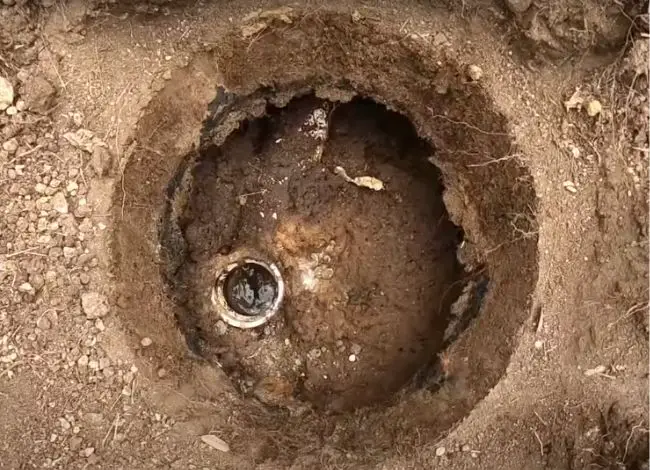
The Over Filled Tanks come to a phase when all the waste is being filled and succumbs to the entire arena and perimeter where the septic tank is situated. The interrogatory point is that the overflow tanks sometimes are so full that it needs to be expected through an outline pipe, and in the end, an enormous truck empties it. When this happens, water backlashes and poops accumulate inside the septic tank.
The water levels will rise to the brim because poops do not get dissolved in the tank, and that creates a mess in the end. The solids create an insurgency in the tank. Unfortunately, it exceeds the main holding capacity of the tank because of the absence of the waste eaters, which are the bacteria and microspores responsible for eating up everything. In this case, you can apply some enzyme to eat away all the slides and clogs and free the tank. Or you can pump the whole thing and empty it fully.
Measures to curb clogged poops
The previous notes show how dangerous poops can be if they are clogged. In this phase, we will illustrate every possible measure to diminish this miserable issue.
What should you do to diminish poop inside an overloaded septic tank?
It is a common scenario that the septic tank comes to a position where it cannot take additional waste inside it. In that period of time, you need to take some steep steps to diminish the issue in a conventional way. The black water contains all the urine and feces, so it is a dangerous type of formation that can somehow cause a disaster for the homeowner. So you need to take some stringent measures as soon as the mechanism inside the tank fails to eat up the additional waste.
Naturally, the septic tank is designed to take both blackwater and greywater. Somehow if any foreign disposable material encompasses the tank, that ether is an ample chance of the tank being clogged. When blackwater gets into the septic tank, it consists of feces that bacteria can digest.
After digestion, this waste turns into gas and liquid. Then pathogens and aerobic bacteria can eat up the whole thing. If their efficiency is a downfall, then you can add extra chemicals to free up the space in the tank. Thus the sludge gets unpreceded and gets dispersed as soon as the enzymes make their position in a disbursed fictionalism. At the very last stage, you need to empty if the tank is over bursting with waste. Call in the municipal trucks, and they will do the rest for you.
How Do You Dissolve poop?
There are some of the greatest methods of dissolving solid poops; consequently, you must follow them and observe which makes you the most of it.
The mixture of Vinegar and Baking Soda
The best method of getting the clogged toilet in a clean position can go for the most majestic way, and that is using the Mixture of Vinegar and Baking Soda. It is a very common and popular solution because it is very easy to use and because people usually already have these ingredients at home, so they don’t have to buy anything ubiquitous. Let me shortly brief the whole process,
At the very beginning, put one cup of baking soda in the bowl and then batter that with a spatula. Then consequently, add a cup of vinegar that will take place in furious action.
A few minutes later, it will start a chemical reaction. And which will create humongous foaming. Pour the vinegar into the road until it makes a soapy solution in the bowl. If the toilet is excessively clogged, then you need to apply a more turbulent flow in the system.
Then you need to add exactly 1 cup of baking soda and 2 cups of vinegar to the toilet. Another alternative is putting 1 cup of salt and 2 cups of baking soda and then applying that in the toilet. The aggregating things are that it can leverage the rough pooping and melt those down, clearing the path of the drainage system. Then let it soak down for about half an hour and flush the toilet. If the issue is still prevalent, then try this process with warm water.
Applying the Bleach
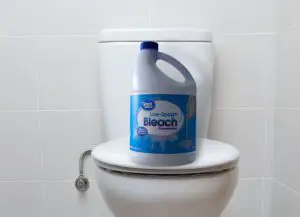 Bleach is an excellent corrosive substance that is used to unclog any dangerous clogs. It can be used with detergent also, and their combination is more than a gigantic stature. Bleach can yield toxic chlorine and can also react with hydrochloric acid, and it can make the toilet fresher than ever. The detergent can occasionally dissolve the waste.
Bleach is an excellent corrosive substance that is used to unclog any dangerous clogs. It can be used with detergent also, and their combination is more than a gigantic stature. Bleach can yield toxic chlorine and can also react with hydrochloric acid, and it can make the toilet fresher than ever. The detergent can occasionally dissolve the waste.
Take 2 cups of bleach with A pot of hot water. Then add some detergent to that mixture. In the end, it will make up for a stronger solution. Then, pour the mixture of bleach and detergent into the toilet. After that, wait for a while, just like half an hour.
Then finally, flush the water by pressing the flush button. The bleach is hydrochloride, which comes close to hydrochloric acid and can yield chlorine, a toxic gas. So you must be very careful about the usage. In this manner, bleach can entirely make things more conclusive. But be very prudent, as bleach can be so corrosive.
Use warm water
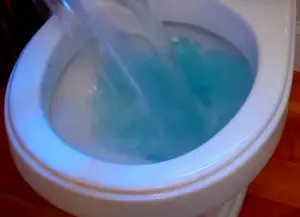 Some of you may find it an unattainable truth that warm water can break down the poop. Yes, this is true. If the blockage inside the toilet seems too obstructed, you can use some boiled water. Hot water can work quite well against feces or toilet paper. The theme of using warm water has come from the attachment that signalized the quantitative aptitude of the erective momentum of the toilet’s mainstream flow.
Some of you may find it an unattainable truth that warm water can break down the poop. Yes, this is true. If the blockage inside the toilet seems too obstructed, you can use some boiled water. Hot water can work quite well against feces or toilet paper. The theme of using warm water has come from the attachment that signalized the quantitative aptitude of the erective momentum of the toilet’s mainstream flow.
It can help soften the blockage in the drainage system so thus the toilet can be unclogged by pouring Hot water. It is best if you use some liters of severely boiled water and pour them at once. Warm water works as an anti-thrust material, so when you pour the warm water, it creates some extra thrusting advantages. So many consequences take over in this skirmish.
Stringent Enzymes
Some special types of Enzymes could be surreal in attenuating the clogs and blockage. This Enzyme liquid is ideal for dissolving hard poop. The enzymes also break down poop in an effective manner. The organic substance in the material is so creepy and soggy, but it can also withstand the effect of heavy-duty clogs. The softener in the enzymes can eat away the hard poops, and in many countries applying the enzymes are so popular as it gives a quick and better result. The enzyme liquid makes it flushable in every possible aspect.
The enzymes are a much safer option and solution than perilous chemicals like hydrogen peroxide. If the hard poop is destroying the fragrance of the system, make sure that the solution estimated in the system can eliminate the smell of the poops. These products are easily available and serve the purpose of house-cleaning and plumbing products. Do not hurry. Give it an hour to settle, and then you can pour hot water in the end so that you can get better results.
Do vinegar and baking soda dissolve feces?
It is the most basic term for eradicating the system’s blockages. Using the mixture of vinegar and baking soda can be a very simplistic and ever-natural type of terminating the worst sludge and clogs.
The mixture gets intense, and they create a better endeavor as well. This mixture’s consistency and density must be at an optimum level to eradicate the worst clogs from the system.
The paste of the vinegar and baking soda needs to be thicker than the actual substance, then applying those in the toilet bowl and waiting for some time can create a fierce structure and then wash them away. This method is always a blockbuster when you are down to breaking the rusty and rotty poops.
What Happens by Applying Bleach On Poop?
Bleaching on poop can be proven so much impactful as it is a tremendously corrosive item that has been used in many aspects of the extremism against the hardcore obstinate poops. Pour some bleach into the toilet and let it settle for some time. Finally, use hot water from the pot. Thus it will push the waste materials into the graveyards. Bleach is the most extreme chemical that breaks down the most coarse material and hard poop; thus, it can save the toilet from overflowing.
You can Pour 2-3 cups of bleach into the toilet and wait for some time. Then clean that with water. It is a very effective method of rusticating rough substances. You may see a foamy solution, and That is because of the chemical reaction between the poop and bleach. Make sure that you lift the rubber gloves and goggles to protect your face from getting any damage from this corrosive element.
Decompose Hard Stools
There are so many ways of decomposing hard stools, and each and every one of those procedures is more than enough to make the entire toilet into the garbage. Let me share with you some of the biggest methods of decomposing hard stools.
- You can use the soda and vinegar mixture to soften the hard stools. Using this mixture of baking soda and vinegar is so effective in unclogging the toilet. This progressive mixture works like a stringent manifesto against the clogged toilet. Actually, this is the most used method to clean toilets worldwide.
- Acute problems related to the plumbing and drainage system can be educated by using the extricate combination of baking soda and vinegar. This makes the stool soluble, and also it is good for the septic tank.
- Warm water is another tremendous addition to unclogging and breaking hard stools. Warm water works as a thrusting agent, and the excess temperature can melt down the hard stools in no time. For better results, use some detergent with boiled water. Thus the clogged feces can be removed easily.
- You can use the Auger and the drain snake to decompose Hard Stools. Auger is a sturdy device that can go down deeper into the toilet, and in the end, you can take advantage of the lengthy snake-like coil to disseminate the chunk of solid poops.
- You can also use the plunger to eradicate the poops. The beehive plunger is the best one for creating a hard-sucking vacuum. Whatever it is, the Auger or the snake or plunger, all of them work more or less the same. Just use them in a structured way. Enter it into the drain and move it backward and forward if it does not reach the clog.
- There are a wide variety of poop cleaners available in the market. You can use one of them, like Drano Max or Redmax Ultra. These cleaners have the ability to cut a solid chunk of hard poops into some pieces of small stools.
Dissolve Poop Quickly
For the poop’s disintegration, invasive treatment, such as snakes, is unnecessary. You can use usual non-invasive options such as hot water, chemicals, baking soda, or a toilet brush. These different approaches can be used depending on the situation and the amount of poop, and there are some fascinating procedures to dissolve poop in a rapid manner.
Applying soda lime
Soda lime is another effective method for inspecting instant clogs. You can eradicate this acute issue by applying different types of code, but baking soda is the most invertible aspect of the formation. These sodas contain figurative chemicals that can easily dissolve poop. After applying the soda, it emanates the bubbling carbonation, meaning it has started the procedure of dissolving poop in a toilet bowl.
Use detergent agent
The stringent detergent agents work as the prime forcing agent in dismantling the hard and harsh poops and other solid items as well. You can apply some detergent to the toilet. Then wait for half an hour and then Pour the drain cleaner chemical into the toilet. In this manner, you can be fair enough to make the trick combustible. Let it soak for a long time, and if this does not work, then try another solution.
Taking professional assistance
If you fail to find anything that is clogging the tramways, then the only thing to be done is to call a plumber for professional help. Old and outdated plumbing and all the plumbing fixtures are not suitable for circulating Feces in a prepositional phrase. The capacity to handle the hard poops in the toilet can be too confusing and time-consuming. You apply all the methods, but if everything is nipped in the bud, then there is no other choice, seek help from a plumber. They will easily seek out why the is not toilet flushing down properly,
Break poops manually
This is probably the dirtiest thing you may ever do. When every mechanism fails, then you need to break those obstinate poops with your hand. For that, put on rubber gloves and then allow yourself to go deeper into the trap ways. Then flush the toilet with warm water. In the end, take some antibacterial agents and also pour that into the toilet. By the way, you need to clean your hand by using some reagent soaps. This will eradicate all the germs that have been crawling into your hands.
How Long Does It Take For Feces To Dissolve In Water?
A clogged toilet is the most unpleasant thing in the world as it stinks. When the stool breaks down itself, if you add some cleaner to the system, the process of dissolving accelerates.
There must be enough pressure of flush so that it can clear the clogs once and for all. The entire process of dissolving the poops takes not more than one month. By the time the procedure ends, it eliminates all the pathogens in fecal substances.
Human waste needs a decent amount of time for composting. High temperatures can dissolve the Feces in a more rapid manner. Research has shown that human feces needs about twelve months to biodegrade completely. Human feces Dissolves In Water more quickly if some dissolving agent has been applied to the system.
Let us witness some other topics that are closely related to the fecal system of the toilet. Here is a simple picturesque blend of those arenas.
What materials should you not flush into the toilet?
The most incredible way to soar up the lifetime of toilet plumbing issues is to avoid showing anything unscrupulous in the toilet. Flushing household plastic products can clog the drain pipes. It pollutes the water system, bolsters, and causes environmental panic. These indispensable semantics can cause major plumbing problems that are very difficult to eradicate.
There are only a few legal and certified things you can flush down in the toilet: urine, poop, toilet paper, and disposable wiping papers. The small diameter pipes cannot withstand so many foreign objects, and as a result, it causes severe clogging in the drainage and sewerage system.
Diapers
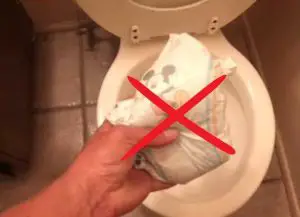 Baby diapers are the most dangerous for surging a clog in the toilet. Unfortunately, toilets can not take disposable diapers as they cannot break into small disposable pieces. If unnecessarily flushing these diapers makes a logjam, then you need to restate the whole thing in a certified manner.
Baby diapers are the most dangerous for surging a clog in the toilet. Unfortunately, toilets can not take disposable diapers as they cannot break into small disposable pieces. If unnecessarily flushing these diapers makes a logjam, then you need to restate the whole thing in a certified manner.
Menstrual pads
Feminine products have always been an acute burden for women. The Menstrual pads can rapidly clog the pipes. You should dispose of the tampons or pads in the dustbin or preserve them in a sanitary bag. Avoid placing the latex and plastic materials also in the toilet as they can swell up with water and block the drainage system, and the sewer or septic system also feels the agony of these products.
Baby food and Toys
Flushing food is not ethical; someday, it can clog the pipes badly. Though baby foods are biodegradable and breakdowns easily, they can swell through the whole thing someday. Cigarette butts are also prohibited to throw in the toilet as they can cause acute clogs.
Undisposable plastics
It is known to everyone that plastic never melts down in the system. This is the biggest culprit that causes severe surges in the drainage system. The Cosmetic wipes also do not dissolve in the drainage system. So avoid flushing these plastic junks, as they can break down the whole system.
Kitty Litter and Hair
Many of you might be aware of the fact that cat poop does not dissolve in the drainage as well, as it can break through the entire system. Cat waste has the most intensified bacterial parasite, which is called Toxoplasma gondii, which attacks humans and causes many diseases.
Water treatment plants can’t beat these pollutants, and these parasitic infections can severely threaten public health. Hairs are also not disposable items in the toilet. It forms giant balls and clogs the whole system. That is responsible for producing massive blockages in the drainage networking system.
Final words
Poop, if not disposed of smoothly, can create a bitter mess on the home toilet. The feces or poop does not dissolve in the toilet, and this can also be stuck in the toilet. The inhuman clogging of the toilet makes the toilet unusable. It will expand the horizon of unhygienic skepticism. A clogged toilet is a horrible incident that you must address as quickly as possible.
The DIY solutions to solve this issue can also be effective enough to eradicate the blockage and clogs. Using chemicals is the best option in this regard, as they can eat down the sludge and waste and clear the path in the drainage system. Poops are so embarrassing, and a visual inspection is the worst thing you can ever imagine. That’s why breaking the poops into pieces and clearing them away is necessary. The dissolving of the poops in the drainage needs a warm water sequence, and then you can mix some other solutions with this.
Try some more ideas and see which one breaks down poop in the toilet. The main theory behind the dissolving of the poop is breaking it into small pieces so that it can flow toward the septic tank. These are some colossal solutions that can keep you from this awkward situation. Try these methods and let us know if you can benefit from them.
We are really lucky to have a hard-working, multi-skilled plumber on our team. Collin D. Gallegos, a professional plumber who has worked with us since 2012, is an expert in vent, septic, and drainage systems. He is a Certified Master Plumber and has worked on various commercial plumbing projects. He usually helps our readers resolve plumbing and pipe-related issues with a proper DIY troubleshooting and repair guide.